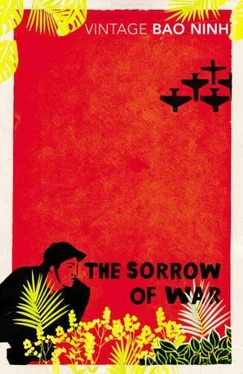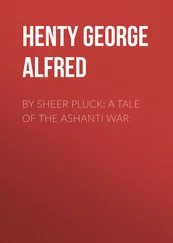Vuong, sitting in the back of the café, started singing an old army song.
‘Listen to that garbage,’ said the leather-jacketed leader. ‘Victory, shit! The victory we got was a victory for morons. Call that civilisation and progress? Garbage!’
‘You sound like garbage yourself,’ said Kien quietly but clearly.
Leather-jacket spun round, ready to pounce. But recognising Kien, he whistled slowly, and began to smile. ‘Well, well, well,’ he said, standing up and walking towards Kien’s table threateningly.
The owner rushed out to stop what he thought would be a fight and Leather-jacket’s mates took hold of him and sat him down. But he paid little attention to them. He moved to sit opposite Kien.
‘I’m garbage? Me? What, and you’re honourable, are you? I seem to remember seeing you last Sunday at the August cinema, when you waltzed in with your beautiful girlfriend. What a joke! Your girlfriend. Know why she was embarrassed? She saw me looking at you both. Shit, she’s a fucking tramp,’ he leered.
Kien slowly put down his cigarette, and took another sip of coffee. But inside he was drying up and unable to respond and his heart beat loudly, anxiously.
Leather-jacket continued: ‘Think I’m a liar? Meet me here tomorrow and I’ll bring the last bloke who screwed her before you got her back. He’ll tell you every itty-bitty detail.’ Kien stared at him but didn’t move or speak.
‘Fuck you! You think I don’t know who you are? I know old Vuong, too. Not only was I a soldier, but a Commander, that’s how I know him. You’re nothing special. And as for her, well, they say those with a bit of a squint like that Phuong of yours are the greatest performers. Do anything. Beautiful, sure, but real screamers. Ask the bloke I’ll bring here tomorrow.’
That was as far as he got. Kien had sprayed his face with boiling coffee and sat waiting quietly for Leather-jacket’s response. An awkward silence fell on the room, broken only by a snort and a snore from Vuong, who had fallen asleep at his table.
‘Why tomorrow, you stinking shit? Now will do,’ said Kien.
Leather-jacket started to waver. ‘Right, right. Just ask Phuong. I’m Hung. She knows me. I taught her some good modern music, and how to really enjoy screwing,’ he said.
Kien moved in on him, punching first, then crunching Leather-jacket’s head with a chair. As Leather-jacket fell Kien grabbed him and violently shredded his clothes, pounding his head repeatedly on the floor. When Leather-jacket had had enough Kien dragged him outside, on the pavement. He was ramming Leather-jacket’s bloody head into a sewer outlet when the police arrived and tried to pull him off. Kien turned on them in a blind rage and began shaping up to fight them, thinking they were Leather-jacket’s mates.
The police released him the next morning. They said they had no wish to charge him. They’d seen enough of the Veterans.
Kien had just returned from the station and stepped inside his room when Phuong came in. He asked how she knew about it so quickly.
‘His mates told me,’ she said.
Drunk. What a night that had been. Now, many years later, he had been welcomed by the owner. That disastrous, bloody fight had been forgotten. The prosperous-looking host now embraced him, shouting for everyone to hear, ‘Kien, Kien, the famous writer!’
His war buddies were proud of him now, too.
He looked over at the little tart who’d started drinking Maxim and pretended to be so worldly. She was out to the world, her head on the table. He dropped some money on the table and left her there.
His watch had stopped, but he guessed a tram was due and would rattle along soon enough. Sure enough a tram came into view in the distance, its bell clanging and its wheels throwing sparks. It was the tram old Huynh had driven before he retired. The old man had lived in the same building and by sheer coincidence, one of his three sons killed in the war had been with Kien when he had died. Kien had edged away from this memory as much as he could for he felt so deeply sorry for the old man. But, riding the same tram, it was inevitable that at times the memories would return.
Huynh sometimes left at first light, sometimes after lunch. His tram-driving shifts were irregular, but he was as regular as clockwork. He looked down when he walked, as though he was afraid of treading on his shadow. His only children, three sons, were all drafted into the army, and they had all been killed in action. The middle one, Toan, had died in front of Kien’s eyes, but he’d never told father Huynh that terrible story. When news of the third son’s death had arrived Huynh’s wife had fallen sick and become paralysed and now the old couple lived miserably, in silence.
He had chatted with Kien sometimes, speaking as though Toan were still alive. Phuong would have been their daughter-in-law, said the old man. When you were both children, the old man confided, Toan’s mother had chosen Phuong to be her son’s wife because she was so lovely. Kien let this news slip by without challenge. They apparently had not known how close Kien and Phuong were in their school days. Toan had never stood a chance with Phuong.
When he was driving, Huynh had let all the children ride free on his tram. In those times the trams had been clean and kept in good condition. Not tattered and rusted, like now. The children would crowd up front, and sometimes the old man would let them ring the bell, or push a pedal.
Kien sat on the rattling tram slowly taking him home after his coffee-shop evening, remembering those days. Kien, Phuong, Toan and Sinh were all in the same class and had become close friends, often riding the tram for fun. Once they’d gone to the old terminus in the suburbs, an area not yet built over.
In a paddock near the terminus there was an old tramcar they used to play in. During one game Phuong and Kien had hidden in one of the compartments and she had embraced him, kissing him on his cheeks and his eyes, with a childish, thirteen-year-old passion.
They were interrupted by a sobbing voice: Toan had seen them and had blocked their way. ‘What are you doing?’ he challenged.
‘Go and hide!’ responded Phuong, thinking quickly. ‘We’re playing hide-aways,’ she added.
‘Liar!’ he said to her. ‘I saw you.’
‘Don’t carry on, Toan. We’ll play husband and wife, just don’t tell anyone if you want to play,’ Phuong replied.
‘Can’t Not with three people’
‘Idiot. ’Course you can. I’m warning you, don’t tell on us,’ she repeated.
On the tram back Phuong and Kien sat together, but Toan stood near his father, blubbering. Huynh asked, ‘Have you been fighting?’
‘No, Daddy.’
‘Why are you crying then?’
Toan didn’t answer.
Phuong sighed. ‘Don’t worry,’ she said ‘he won’t tell.
Half a lifetime later Toan and Kien had been together, almost by accident, on the final day of fighting, just before the attack on Saigon airport on 30 April 1975.
They were at Gate 5, Tan Son Nhat. Toan was on the machine-gun mounted on an armoured car. Kien, an infantry scout, stayed under cover by tracking behind a T54 tank. Fifteen minutes into the action they saw each other and wildly shouted to each other in greeting.
As they finished waving an anti-tank rocket fired by the defenders missed the tank Kien was using for protection and whistled past him, scoring a direct hit on Toan’s armoured car, blowing it into pieces, incinerating Toan and his entire crew.
The tram turned into Kien’s street, ending both his physical journey and his journey into the past with Toan, and with Phuong. As he alighted from the tram he automatically looked up to her window, hoping to see the teenage Phuong there, repeating those urgent little love cries she used to utter. But she was not there, of course. She’d long gone, from that teenage world, and from the adult world. She had now departed from both of his worlds.
Читать дальше












